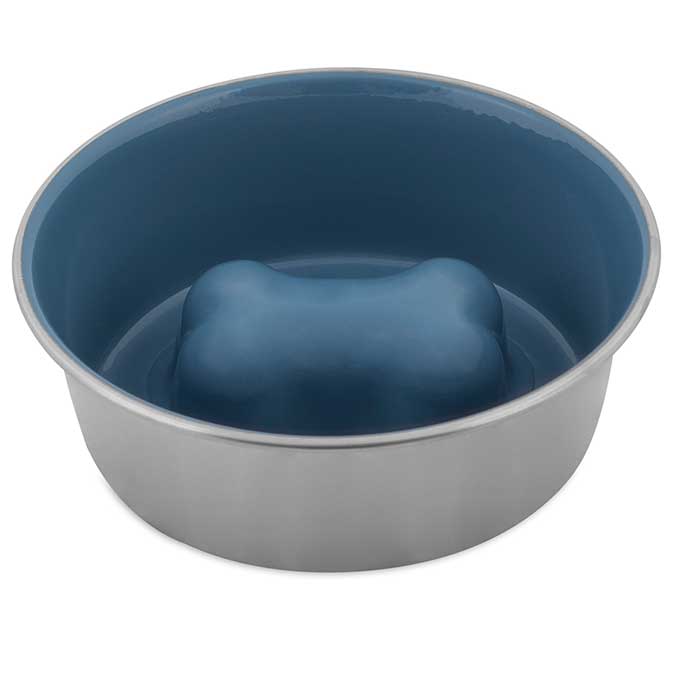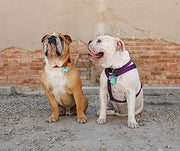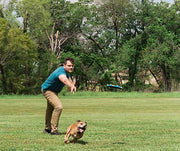Preventing Bloating in Dogs

Bloating is never fun. It can be uncomfortable for us as humans, but did you know that for dogs, it can be extremely dangerous? It can lead to something called "gastric dilation volvulus" (GDV). This is a serious condition where a dog's stomach will expand from excessive gas and twist, blocking the release of gas and air. Without immediate medical attention and emergency surgery, this situation can easily become fatal. Bloat cannot and should not be treated at home. The best thing you can do is prevent it before it starts.
What Causes Bloating?
There is no singular cause for bloating in dogs. It can happen due to a variety of reasons, such as swallowing excessive amounts of air, strenuous activity, or exercising right after mealtime. Deep-chested breeds such as Great Danes are also more likely at risk of bloat than other types of dogs. Fetch by WebMD also states that any dog weighing over 90 pounds is 20% more at risk for bloat than smaller dogs.
Stress may be another factor that leads to bloating. In both humans and dogs, stressors can cause digestive problems. Long car rides, strangers, or other pets in the home, for example, may cause your dog to become anxious and at risk for bloat.
Symptoms of Bloat
If you notice any of these symptoms, take your dog to the emergency vet immediately.
- Distended (swollen) stomach
- Abdominal pain
- Labored breathing
- Shock
How to Prevent Bloating in Dogs
Feed Your Dog Smaller Portions Throughout the Day:
Dogs that are fed at sporadic intervals tend to eat faster and more frantically than those that are fed on a consistent schedule. Eating too quickly can have severe consequences, and bloating is one of them. According to the American Kennel Club, dogs that are fed only one meal per day are twice as likely to experience bloat than those who are fed twice or more a day.
Avoid Exercising Your Dog Before or Immediately After Meals:
As humans, we know that exercising too close to mealtimes can cause an upset stomach or other digestive issues. The same is true for dogs. Do your best to not schedule walks or exercise too close to meals. Give your dog a bit of time to digest their food before encouraging them to take laps around the yard.
Encourage Your Dog to Eat More Slowly:
In addition to feeding your dog smaller portions throughout the day, you can encourage them to eat more slowly so they don't swallow too much air. Consider getting your dog a puzzle-treat toy. This is a great way to keep them mentally stimulated while also helping them slow down their eating. Feeder Bowls are another good option when feeding them their regular meals. Slow Feeders are dog feeding bowls that are designed to make dogs "work" for their food. This causes the dog to slow down in between bites as they work for their next bite. Petmate's Slow Feed Bowl has a bone that sticks out in the middle of the bowl, causing the food to disperse around the bone. As your dog eats, she has to work around the bone, causing her to take smaller bites.

Pay Attention to Your Dog's Diet:
What your dog eats matters! While it may be tempting to slip them scraps of your food from the dinner table, human food can cause excessive gas which may lead to bloating. Certain dog foods may also lead to an increased risk of bloat. For example, dry dog food can cause blockages and is also high in carbohydrates. Ideally, your dog's diet should be low in carbs and high in protein. Before switching your dog's food, though, be sure to first speak with a vet. They will be able to give you the best recommendation based on your dog's medical history and can provide you with pointers to make the transition to a new food as smooth as possible.
Conclusion
Watching your dog sit in pain due to bloating is never fun. While there's not a singular cause for bloating in dogs, most of the time, it's due to their eating habits. So, be sure you follow our tips to prevent bloating in your dog. As always, if you have concerns, call your vet and consult with them.
Additional Resources:
Previous article

Next article

Related posts
View all-

How to Keep Your Pet Calm During Thanksgiving
Thanksgiving is a time for family, friends, and food, but for our pets, the holiday can be overwhelming. The sudden change in routine, unfamiliar faces and scents, and increased noise can trigger significant stress. Understanding why your pet might feel anxious is the first step toward creating a peaceful holiday experience for everyone, including your furry family members. This guide offers calming tips for pets and practical solutions to ensure your dog or cat feels safe and secure during the festivities.
Read Article -

Top Travel Essentials for Pets This Holiday Season
Holiday travel often means bringing the whole family along, and for many of us, that includes our furry companions. Preparing for holiday pet travel is about more than just packing a bag; it's about ensuring your pet's safety, comfort, and happiness from the moment you leave home until you return. A little planning helps reduce stress for both you and your pet, making the journey a positive experience for everyone involved.
Read Article -

Best Leashes and Collars for Daily Walks: A Pet Parent’s Guide
A daily walk with your dog isn't just a chore—it's a chance to bond, explore, and stay active together. The right leash and collar can make every walk safer and more enjoyable for both of you. With numerous styles and materials available, it's essential to find gear that suits your dog's needs and your lifestyle.
Read Article



